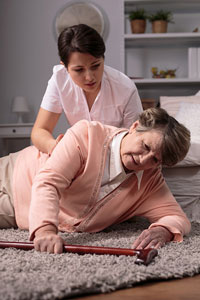The SA Coroner has recommended that any Elder who has a fall in a Nursing Home, who is on anticoagulant medication (for example but not limited to Clexane & Warfarin) AND who has a pre-existing cognitive impairment must be sent to the hospital to be checked for intracranial bleeding. Falls in the Elderly community are common and are one of the main reasons family members seek in Home Care from Daughterly Care. Additionally, falls may account for up to 83% of reported incidences in Nursing Homes*.
What are the effects of intracranial haemorrhage?
Besides depriving the brain of oxygen and killing brain cells, bleeding inside the brain also prevents nerve cells from communicating with the parts of the body and the functions they control. This results in a loss of memory, speech or movement in the affected area.
Depending on the location of the haemorrhage and the extent of damage, the lasting effects of the intracranial haemorrhage can include:
- Inability to move part of the body (paralysis);
- Numbness or weakness in part of the body;
- Difficulty swallowing;
- Vision loss;
- Inability to speak or understand words (difficulty with communicating or comprehension);
- Confusion, memory loss, or poor judgement;
- Personality change and / or emotional problems;

What are the symptoms of all intracranial hemorrhage?
- Sudden tingling, weakness, numbness or paralysis of the face, arm or leg, particularly on one side of the body;
- Sudden and severe headache;
- Difficulty with swallowing or vision;
- Loss of balance or coordination;
- Difficulty understanding, speaking (slurring nonsensical speech), reading or writing;
- Change in level of consciousness or alertness, marked by stupor, lethargy, sleepiness, or coma
South Australia Coroner’s Report
The South Australia Coroner’s report makes recommendations for the management of care recipients on anticoagulant therapy who suffer a fall that results in a minor head injury.
The report notes:
- the increased risk of intracranial bleeding associated with anti-coagulation therapy,
- care recipients with pre-existing cognitive impairment may have a lot of cerebral shrinkage and this can mean that it is often difficult to detect intracranial bleeding until it is too late.
The report also notes that the Nursing Home concerned has amended its protocols and now requires any care recipient on anticoagulant therapy to be sent to hospital for assessment following a fall, particularly if it results in a minor head injury.
Click here for the Department of Health Industry Alert initiated from the South Australian Coroner.
Source:^ http://www.health.nsw.gov.au/falls/Publications/economic-evaluation-falls-prevention.pdf
The effects of having a fall are multi-layered
When someone suffers a fall, it not only affects them physically but emotionally. Even if they don’t break bones or suffer a head injury, Elders lose confidence in their mobility thus reducing their social contact and increasing their dependence on family. They may even be reluctant to undertake programs that help them re-establish their confidence and mobility.
Daughterly Care has trained Caregivers in an evidence-based program that has been proven to help Elders prevent falls by 31% and implement strategies to assist Elders to regain the confidence they have lost after a fall. We also have great information on ‘How to prevent falls for Elders’.
If you or a Loved One needs some assistance after a fall, give us a ring and we can help advise you on the best care to recover. Call 02 9970 7333
For more information on falls take a look at these pages:
Elders home safety and fall prevention
How to reduce falls in Elders by 31%
Elders Can Regain Confidence After A Fall with In Home Care
Preventing falls in the home
Elder Care Myth No.1- You HAVE to go to a Nursing Home
* https://www.health.qld.gov.au/stayonyourfeet/facts/statistics.asp

Leave A Comment